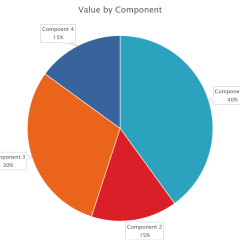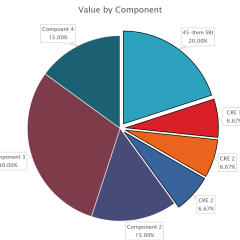By Tom
In my last post I pointed out some recent changes the National Board for Professional Teaching Standards has made in the renewal process, which is how NBCTs keep their hard-earned certificates alive and well. Today I’m turning my attention to something I briefly alluded to in that post, namely the actual scoring system: the amount of points the NB assigns to each part of the assessment process.
 Take a look at Figure 1. (If you click on it, it’ll make it bigger.) As you can see, Component 1, which focuses on content and pedagogical knowledge, accounts for 40% of a candidate’s total score. The other 60% is shared by Components 2 through 4, with Component 3 getting the lion’s share. (That’s because Component 3 involves submitting two separate videos, along with corresponding written commentary; it’s actually twice as much work as Component 2, so it’s worth twice as much.)
Take a look at Figure 1. (If you click on it, it’ll make it bigger.) As you can see, Component 1, which focuses on content and pedagogical knowledge, accounts for 40% of a candidate’s total score. The other 60% is shared by Components 2 through 4, with Component 3 getting the lion’s share. (That’s because Component 3 involves submitting two separate videos, along with corresponding written commentary; it’s actually twice as much work as Component 2, so it’s worth twice as much.)
Astute readers will note that this pretty much lines up with the NB’s past system, in which the Assessment Center Exercises were worth 40% of the total score, and the four entries were worth a combined 60%. The rationale, as I understood it, was that the NB values both knowledge and accomplished practice, but it values classroom practice a little more. Actually, 20% more. And I think most teachers would agree with that balance: knowledge is important, but not as important as what the teacher actually does in front of the students. Furthermore, if you look at the NB’s standards for any of the 25 certificate areas, you’ll notice that there’s a standard focused on content knowledge, along with about ten other standards that deal with applying that knowledge to classroom practice.
 Which brings me to figure 2, showing the breakdown within Component 1. Notice that Component 1 has four separate parts: three Constructed Response Exercises (CREs) and one 45-question multiple-choice test, known as the Selected Response Items (SRIs). The CREs are not new; the NB simply selected three of the six Assessment Center Exercises and re-purposed them as CREs. The SRIs are new. The NB essentially took the content knowledge previously addressed by the three abandoned Assessment Center Exercises and used multiple-choice questions to address it instead. Easy-Peasy.
Which brings me to figure 2, showing the breakdown within Component 1. Notice that Component 1 has four separate parts: three Constructed Response Exercises (CREs) and one 45-question multiple-choice test, known as the Selected Response Items (SRIs). The CREs are not new; the NB simply selected three of the six Assessment Center Exercises and re-purposed them as CREs. The SRIs are new. The NB essentially took the content knowledge previously addressed by the three abandoned Assessment Center Exercises and used multiple-choice questions to address it instead. Easy-Peasy.
But here’s the interesting thing. The 45-question multiple-choice test is now worth 20% of a candidate’s total score. That’s kinda a lot. In fact, as you can tell from my pie chart, it’s worth more than either Component 2 or Component 4. The only part that’s worth more is Component 3. Frankly, I find that indefensible.
As I said earlier, content knowledge is important. Real important. Teachers need to know what they’re talking about. But I honestly don’t think a 45-question multiple-choice test should trump Component 2, which focuses on a teacher’s ability to analyze student work. In fact, I’m not even sure the 45-question test should count for more than either of the three CREs.
If I could offer a suggestion, it might be more appropriate to simply award 10% to each of the four parts of Component 1. In fact, that’s exactly what I told the National Board a few weeks ago when I had a chance.
What do you think? The National Board values our feedback, and like I said in the last post, this is OUR National Board. Let them know.
I agree, Mark. I also worry that with so much value placed on the multiple choice questions, candidates will begin “studying” by learning how to figure out strategies for answering those types of questions. In other words, gaming it.
When I sat for the assessment center, the degree of complexity I felt that was demanded in my response can in no way be replaced by a multiple choice question. I had to articulate my thought processes, justify my interpretations, and show critical thinking. That was more valuable, in my opinion, than what I think a multiple choice assessment would enable me to show. I have a degree in English and am full of utterly useless trivia about authors and poets, schools and movements, and all sorts of “content” related to English Language Arts. I can define and identify literary terms, blah and blah and blah. I would do wonderfully on a multiple choice test (and have done so in the past). And so would many, many English teachers who are highly ineffective teachers—-or not teachers at all.
I believe that assessment of content knowledge ought to be in the context of teaching that content. That is the purpose of such content knowledge, after all.